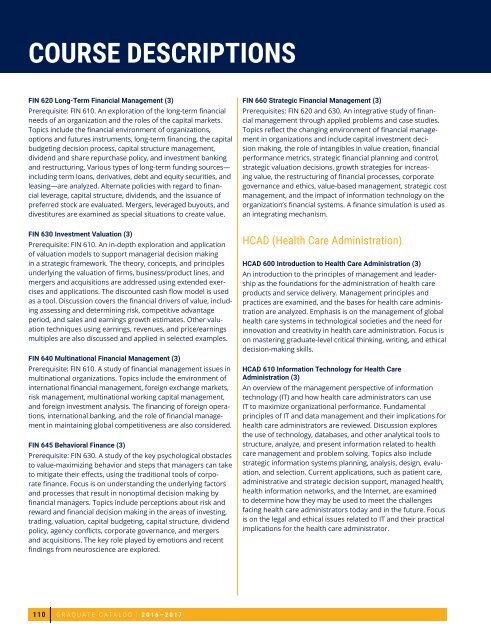2016–2017 2016–2017
2016-2017-graduate-catalog
2016-2017-graduate-catalog
Create successful ePaper yourself
Turn your PDF publications into a flip-book with our unique Google optimized e-Paper software.
COURSE DESCRIPTIONS<br />
FIN 620 Long-Term Financial Management (3)<br />
Prerequisite: FIN 610. An exploration of the long-term financial<br />
needs of an organization and the roles of the capital markets.<br />
Topics include the financial environment of organizations,<br />
options and futures instruments, long-term financing, the capital<br />
budgeting decision process, capital structure management,<br />
dividend and share repurchase policy, and investment banking<br />
and restructuring. Various types of long-term funding sources—<br />
including term loans, derivatives, debt and equity securities, and<br />
leasing—are analyzed. Alternate policies with regard to financial<br />
leverage, capital structure, dividends, and the issuance of<br />
preferred stock are evaluated. Mergers, leveraged buyouts, and<br />
divestitures are examined as special situations to create value.<br />
FIN 660 Strategic Financial Management (3)<br />
Prerequisites: FIN 620 and 630. An integrative study of financial<br />
management through applied problems and case studies.<br />
Topics reflect the changing environment of financial management<br />
in organizations and include capital investment decision<br />
making, the role of intangibles in value creation, financial<br />
performance metrics, strategic financial planning and control,<br />
strategic valuation decisions, growth strategies for increasing<br />
value, the restructuring of financial processes, corporate<br />
governance and ethics, value-based management, strategic cost<br />
management, and the impact of information technology on the<br />
organization’s financial systems. A finance simulation is used as<br />
an integrating mechanism.<br />
FIN 630 Investment Valuation (3)<br />
Prerequisite: FIN 610. An in-depth exploration and application<br />
of valuation models to support managerial decision making<br />
in a strategic framework. The theory, concepts, and principles<br />
underlying the valuation of firms, business/product lines, and<br />
mergers and acquisitions are addressed using extended exercises<br />
and applications. The discounted cash flow model is used<br />
as a tool. Discussion covers the financial drivers of value, including<br />
assessing and determining risk, competitive advantage<br />
period, and sales and earnings growth estimates. Other valuation<br />
techniques using earnings, revenues, and price/earnings<br />
multiples are also discussed and applied in selected examples.<br />
FIN 640 Multinational Financial Management (3)<br />
Prerequisite: FIN 610. A study of financial management issues in<br />
multinational organizations. Topics include the environment of<br />
international financial management, foreign exchange markets,<br />
risk management, multinational working capital management,<br />
and foreign investment analysis. The financing of foreign operations,<br />
international banking, and the role of financial management<br />
in maintaining global competitiveness are also considered.<br />
FIN 645 Behavioral Finance (3)<br />
Prerequisite: FIN 630. A study of the key psychological obstacles<br />
to value-maximizing behavior and steps that managers can take<br />
to mitigate their effects, using the traditional tools of corporate<br />
finance. Focus is on understanding the underlying factors<br />
and processes that result in nonoptimal decision making by<br />
financial managers. Topics include perceptions about risk and<br />
reward and financial decision making in the areas of investing,<br />
trading, valuation, capital budgeting, capital structure, dividend<br />
policy, agency conflicts, corporate governance, and mergers<br />
and acquisitions. The key role played by emotions and recent<br />
findings from neuroscience are explored.<br />
HCAD (Health Care Administration)<br />
HCAD 600 Introduction to Health Care Administration (3)<br />
An introduction to the principles of management and leadership<br />
as the foundations for the administration of health care<br />
products and service delivery. Management principles and<br />
practices are examined, and the bases for health care administration<br />
are analyzed. Emphasis is on the management of global<br />
health care systems in technological societies and the need for<br />
innovation and creativity in health care administration. Focus is<br />
on mastering graduate-level critical thinking, writing, and ethical<br />
decision-making skills.<br />
HCAD 610 Information Technology for Health Care<br />
Administration (3)<br />
An overview of the management perspective of information<br />
technology (IT) and how health care administrators can use<br />
IT to maximize organizational performance. Fundamental<br />
principles of IT and data management and their implications for<br />
health care administrators are reviewed. Discussion explores<br />
the use of technology, databases, and other analytical tools to<br />
structure, analyze, and present information related to health<br />
care management and problem solving. Topics also include<br />
strategic information systems planning, analysis, design, evaluation,<br />
and selection. Current applications, such as patient care,<br />
administrative and strategic decision support, managed health,<br />
health information networks, and the Internet, are examined<br />
to determine how they may be used to meet the challenges<br />
facing health care administrators today and in the future. Focus<br />
is on the legal and ethical issues related to IT and their practical<br />
implications for the health care administrator.<br />
110<br />
GRADUATE CATALOG | <strong>2016–2017</strong>


